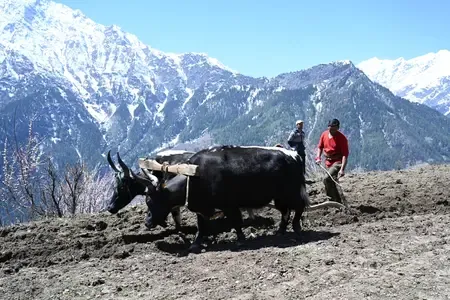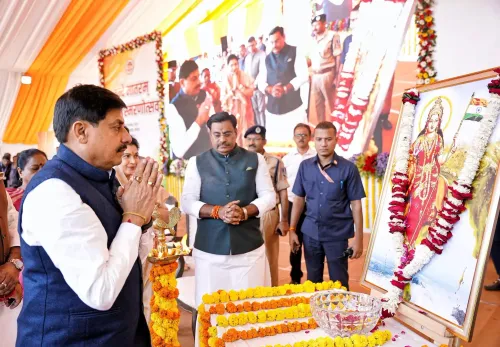Are 2,244 Families Embracing Chemical-Free Farming in Himachal's Remote Pangi?

Synopsis
Key Takeaways
- 2,244 families have adopted chemical-free farming methods.
- Pangi Valley is recognized as Himachal Pradesh's first natural farming subdivision.
- The initiative aims to convert 2,920 hectares of land to sustainable farming.
- Farmers are benefiting from improved soil health and reduced costs.
- Community support and training will enhance farming practices.
Shimla, July 27 (NationPress) In a remarkable development, just under four months after designating the mountainous Pangi region in Chamba district as Himachal Pradesh's inaugural natural farming subdivision, 2,244 families have engaged in chemical-free farming practices within the valley.
The state government announced on Sunday its intention to convert the entirety of 2,920 hectares of cultivated land, encompassing agriculture, horticulture, and varied farming sectors, to 100 percent natural farming in the isolated Pangi Valley.
Local inhabitants, primarily farmers and shepherds, have expressed their appreciation for the government’s formal recognition of their area as the first natural farming subdivision. They regard this decision as a vital stride towards safeguarding their traditional agricultural practices, bolstering food security, and fostering sustainable livelihoods in the remote regions adjacent to Jammu and Kashmir.
On Himachal Day, April 15, Chief Minister Sukhvinder Sukhu shared this significant announcement.
Raj Kumar, a resident of Dhanvas village within the valley, remarked, “This decision was long overdue, but it’s uplifting that the state government has finally initiated measures for the benefit of the people in this region. Families who have leased their land for cultivation while residing outside Pangi now regret it, as chemical farming has rendered their land barren.”
Farmers are witnessing that natural farming has already yielded positive outcomes in enhancing soil health, minimizing expenses, and restoring ecological balance. They believe that this official acknowledgment will elevate visibility, institutional backing, and market possibilities for their distinctive and naturally cultivated products.
Other cultivators, Sheela Devi and Sunita Kumari from Punto village, shared, “We are not positioned to explore entrepreneurship as we have limited means and only small landholdings. However, if we adopt chemical-free farming practices today, we will possess something precious to pass on to future generations.”
Acting on the Chief Minister’s direction, the Agriculture Department has formulated a comprehensive roadmap aimed at providing support, training, and capacity building for farmers. This initiative will be executed in a phased and decentralized manner. Initial phases will involve village-level planning, assessments, and mobilization efforts, succeeded by extensive training programs and practical demonstrations, as stated by an official.
To ensure the timely availability of inputs for natural farming, panchayat-level bio-input resource centres (BRCs) will be established to supply natural formulations such as ‘beejamrit’, ‘jeevamrit’, ‘dashparni ark’, and ‘agniastra’. These centres will also serve as community hubs for training and knowledge sharing, especially aiding farmers lacking cows, which are crucial for producing many of these inputs.
In subsequent phases, the initiative will prioritize infrastructure development, including the establishment of poly-houses, cold storage units, and other necessary facilities. Additionally, the promotion of self-help groups (SHGs), farmer producer organizations (FPOs), and farmer producer companies (FPCs) will be encouraged to enhance farmer institutions and collective bargaining power.
Deepak Kumar, village head of Suraal gram panchayat, stated, “This is a significant step towards the economic advancement of our area, as products from natural farming will yield fair and rewarding prices for our farmers' diligent efforts. We are thankful to the state government, particularly Chief Minister Sukhvinder Sukhu, for his personal commitment to uplifting the economy of this region through the promotion of natural farming in the Pangi Valley.”








